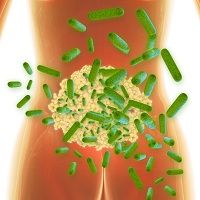Article
Bile Acids Provide Novel Approach to Clostridium Difficile Treatment
Author(s):
Potential new treatment options could develop from research conducted at North Carolina State University and University of Michigan involving secondary bile acids.

Multiple secondary bile acids that are altered by bacteria normally living in the large intestine appear to inhibit clostridium difficile, (C. diff) spore germination and growth at physiological concentrations.
A recent study conducted by researchers from North Carolina State University and the University of Michigan believe this could represent new targets to combat C. diff in the large intestine. The study investigators suggest their findings shed light on how some commonly used antibiotics can promote C. diff infections by killing off the bile-altering microbes.
Prior research has shown that certain antibiotics alter the gastrointestinal microbiota, which has contributed to the growing C. diff problem. Studies have also found that structure changes in the gut microbiota alter the metaboiome, specifically secondary bile acid production. Whereas specific bile acids have been shown to initiate C. diff spore germination and also inhibit C. diff growth in vitro, physiologically relevant bile acids in the gastrointestinal tract had not been previously defined.
For the study, Casey Theriot, PhD, Assistant Professor of Infections Disease at North Carolina State University, and colleagues sought to determine exactly how C. diff spores interact with microbiota in the gut. “We know that within a healthy gut environment, the growth of C. diff is inhibited,†she said. “But we wanted to learn more about the mechanisms behind that inhibitory effect.â€
In the January 6, 2016 issue of mSphere, Theriot and colleagues explained how Theriot began the current study as a research investigator at the University of Michigan along with infectious disease physician Vincent Young, MD, PhD, an associate professor in the Departments of Internal Medicine and the Department of Microbiology and Immunology and undergraduate researcher Alison Bowman in the Department of Internal Medicine.
For the study, the team treated mice with various antibiotics to create distinct microbial and metabolic (bile acid) environments and directly tested their ability to support or inhibit C. diff spore germination and outgrowth ex vivo. They identified 26 primary and secondary bile acids and defined their concentrations before and after treatment. C. diff spores were added to the contents in order to determine how the bacterium would germinate and grow in an actual gut environment.
“Susceptibility to C. difficile in the large intestine was observed only after specific broad-spectrum antibiotic treatment (cefoperazone, clindamycin, and vancomycin) and was accompanied by a significant loss of secondary bile acids (deoxycholate, lithocholate, ursodeoxycholate, hyodeoxycholate, and ω-muricholate),†the researchers wrote.
“These changes were correlated to the loss of specific microbiota community members, the Lachnospiraceae and Ruminococcaceae families. Additionally, physiological concentrations of secondary bile acids present during C. difficile resistance were able to inhibit spore germination and outgrowth in vitro. Interestingly, we observed that C. difficile spore germination and outgrowth were supported constantly in murine small intestinal content regardless of antibiotic perturbation, suggesting that targeting growth of C. difficile will prove most important for future therapeutics and that antibiotic-related changes are organ specific.â€
Theriot added, “These findings are a first step in understanding how the gut microbiota regulates bile acids throughout the intestine. Hopefully they will aid the development of future therapies for C. difficile infection and other metabolically relevant disorders such as obesity and diabetes.â€




